- Home
- Joy Fielding
The Final Act Page 20
The Final Act Read online
Page 20
“About Julia, of course,” Elizabeth answered, the name sliding easily off her tongue, as if she’d known Julia all her life. “And you.”
“Me?”
“What you’re going through.”
“You have no idea what I’m going through.” Cindy brushed an unwanted tear away from her cheek, felt another one rush to take its place.
“That’s what I need you to tell me,” the woman urged gently.
Cindy shook her head, as if Elizabeth Kapiza could see her. “I don’t think so.”
“Please,” the reporter said softly. “I can help you.”
“By exploiting my daughter?”
“Cindy,” Elizabeth Kapiza said, the name wrapping itself around Cindy’s shoulder like a lover’s arm, “the more publicity there is in cases like this, the more chance there is of a happy ending.”
A happy ending, Cindy repeated silently. How long had it been since she’d believed in happy endings? “I’m sorry. I don’t think there’s anything I can tell you that would help.”
“You’re her mother,” Elizabeth said simply.
“Yes,” Cindy agreed, unable to find the strength to say more.
“Would you at least think about it, and call me if you change your mind?” Elizabeth Kapiza relayed her office telephone number, her home number, and the number of her cell phone, then repeated them all again as Cindy obligingly scribbled them across the bottom of a Kleenex box, although she had no intention of calling the woman back.
She barely had one foot out of bed when the phone rang again. This time it was a reporter from the Globe and Mail, calling for a quote. Cindy mumbled something about just wanting her daughter back home safe and sound, then mumbled roughly the same sentiments to the reporters from the Star and the Sun, both of whom phoned just after she’d emerged from the shower. How long has your daughter been acting? they asked. What are some of her credits?
Cindy combed her wet hair away from her face, then pulled on a pair of blue jeans and a white T-shirt, and went downstairs, Elvis running along ahead of her, impatiently pacing back and forth in front of the door as she opened it.
Julia’s face stared up at her from the front pages of both the Globe and the Star. ACTRESS, 21, MISSING 6 DAYS, read the copy beneath the familiar black-and-white photograph. From the kitchen, the phone started ringing. Cindy ignored it as she walked into the room, and spread the papers across the table.
Police are investigating the disappearance of beautiful aspiring actress, Julia Carver, 21, missing since last Thursday. Ms. Carver, daughter of prominent entertainment lawyer Tom Carver, vanished without a trace after a meeting with renowned Hollywood director Michael Kinsolving.
Cindy read the paragraph once, then read it again out loud as the phone continued its stubborn ringing.
“ ’Police are investigating the disappearance of beautiful aspiring actress, Julia Carver, 21, missing since last Thursday. Ms. Carver, daughter of prominent entertainment lawyer Tom Carver. . .’ ”
Cindy smiled, pushing the Globe out of the way, and reaching for the Star. The phone stopped ringing, started up again almost immediately.
ACTRESS GOES MISSING AFTER AUDITION WITH HOLLYWOOD DIRECTOR, read the caption underneath Julia’s picture. Julia Carver, 21, the beautiful actress-daughter of entertainment lawyer Tom Carver, has been missing from her Toronto home since Thursday, August 29.
“No,” Cindy said, reading it again, and then again.
Beautiful actress-daughter of entertainment lawyer Tom Carver.
Daughter of prominent entertainment lawyer Tom Carver.
As if Julia has only one parent, Cindy thought, a feeling of outrage growing inside her stomach, like a malignant tumor. When had she become nonexistent? When had she ceased to matter? It was almost as if, like her daughter, Cindy Carver had suddenly and without notice vanished from the face of the earth. The newspapers, with a couple of careless phrases, had erased her from the landscape, swept her from her daughter’s life.
Once again, Tom had stolen Julia from her. This time, without even trying.
The press had made it official: Julia was Tom Carver’s daughter.
Her mother was nowhere in sight.
The phone stopped ringing.
“I don’t exist,” Cindy told Elvis, whose response was to lift his leg and pee against the side of her chair. Cindy stared at her daughter’s scruffy terrier, torn between crying and laughing out loud. “It’s okay,” she said, grabbing some paper towels from the counter and soaking up the mess, quietly accepting the blame for the dog’s errant behavior. It was her fault, after all. She should have taken him out. Everything was her fault. She was as lousy a mother to Elvis as she’d been to Julia. “Julia Carver,” she whispered, staring at her daughter’s picture on the front pages of the papers, “daughter of Cindy. Daughter of Cindy, damn it.” And I will not be brushed aside again, she added silently. I will not just disappear.
I don’t think there’s anything I can tell you that would help, she’d told Elizabeth Kapiza.
You’re her mother.
“Yes, I am,” Cindy said, pushing herself to her feet and walking to the phone, quickly punching in the last of the numbers she’d scribbled on the bottom of the Kleenex box earlier, and had no trouble recalling now. “Elizabeth Kapiza?” she asked the woman who answered on the first ring, as if she’d been waiting for Cindy to call. “This is Cindy Carver.”
“When can I see you?” the reporter asked.
“How’s nine o’clock?”
*
BY EIGHT-THIRTY, Cindy had changed her clothes three times and was on her fourth cup of coffee.
“You look nice,” her mother told her, coming into the kitchen, neatly dressed in varying shades of blue. “Is that a new blouse?”
Cindy smoothed the front of a pink silk shirt she’d bought on impulse at Andrew’s the previous summer, but had never worn because it wasn’t really her. Was it her now that she was no longer a person of substance? she wondered, securing the button at the top. “You want some breakfast?”
“Coffee’s fine for now,” her mother said, helping herself. “Who’s been phoning so early in the morning?”
“Who hasn’t?”
Her mother shrugged. “I take it nothing’s new.”
Cindy pushed the morning papers toward her. “See for yourself.”
Norma Appleton scanned the front pages of both papers. “Oh, my,” she said, sinking into one of the kitchen chairs.
“Elizabeth Kapiza’s coming to the house in half an hour to interview me.”
“You think that’s wise?”
“I phoned the police,” Cindy told her mother. “They said they don’t have a problem with it as long as I don’t talk about the investigation. They said it might even help.”
Her mother sipped her coffee slowly, ran shaking fingers along her granddaughter’s grainy cheek. “Where’s Heather off to so early?”
Cindy regarded her mother quizzically. What was she talking about?
“Where’s Heather going?” Norma Appleton asked again.
“I don’t understand.”
It was her mother’s turn to look confused. “When I got up, she was packing.”
“Packing? What are you talking about?” Cindy ran into the front hall just as Heather appeared at the top of the stairs, an overnight bag in her hands. “What are you doing?”
“I thought I’d stay over at Daddy’s for a few days,” Heather said, proceeding slowly down the steps, dropping the black leather overnight bag to the floor as she reached the bottom. “Hi, Grandma.” She waved to the woman watching from the kitchen doorway.
“Hi, sweetheart.”
“Why are you doing this?” Cindy asked.
“What’s going on?” Norma Appleton’s eyes darted back and forth between her daughter and her grand-child.
“Things are pretty intense around here. I thought Mom could use a little space,” Heather explained. “And it’s been a while since I spe
nt any serious time at Dad’s. It’s just for a few days,” she said again.
“Heather, please, if this is about last night. . .”
“What happened last night?” her mother asked.
“I’ve already called Dad,” Heather said. “He’s picking me up in a few minutes.”
“You know how sorry I am. You know I didn’t mean to slap you.”
“You slapped her?” her mother said.
“It’s not that,” Heather said.
“Then why are you going?”
Heather hesitated, her eyes filling with tears. “I just think it’ll be better for everyone if we take a small break.”
Cindy shook her head. “Not for me.”
Heather hesitated, her body swaying toward her mother. “I’ve already called Dad.”
“Call him back.”
The doorbell rang.
“Please, darling,” Cindy continued, following Heather to the front door. “Tell him you changed your mind. He’ll understand.”
Heather took a deep breath, opened the door.
“I take it you’ve seen the morning papers,” Leigh said, her hair a war zone of conflicting curls. She dropped a small suitcase to the floor at Heather’s feet.
“What’s this?” Cindy eyed the beat-up, brown leather suitcase suspiciously.
“I’ve been calling you for over an hour. Either the phone is busy or nobody answers. I finally got fed up and told Warren that’s it. I can’t stand not knowing what’s going on. He’ll have to manage without me for a while. I’m moving in with you guys until we know what’s what.”
“No,” Cindy said quickly. Then, “That’s really not necessary.”
“Heather and Duncan can sleep downstairs. I’m sure they won’t mind. My back’s too fragile for sofa beds.”
“Actually, I’ll be staying at my father’s for a few days.”
“Well, then, that worked out perfectly, didn’t it?” Leigh said.
“No,” Cindy protested again, as outside a car horn honked twice.
“That’ll be Dad.” Heather glanced out the open door as Tom’s dark green Jaguar pulled into view.
“Please, Heather,” Cindy tried one last time.
“Don’t worry, Mom. It’ll be okay. I’ll call you later.” Heather’s lips brushed against her mother’s cheek. Then she ran down the front steps, throwing her overnight bag into the backseat of her father’s car, and climbing into the front seat beside him.
(Flashback: Julia carries her new Louis Vuitton luggage to Tom’s waiting BMW, waits while he puts it inside the trunk, then slides into the front seat next to him.)
Cindy watched as Tom’s car pulled away from the curb.
She was still standing at the front door staring down the empty street when Elizabeth Kapiza showed up at precisely nine o’clock, tape recorder in hand, photographer in tow.
THE NATIONAL POST
Thursday, September 5, 2002
A Mother’s Anguish
BY ELIZABETH KAPIZA
TORONTO, SEPTEMBER 5—She sits in the living room of her spacious, art-filled home in midtown Toronto, a woman whose pale face is ravaged by uncertainty and fear. Tears are never far from her expressive blue eyes; they stain the front of her stylish, pink silk blouse. “I’m sorry,” she apologizes repeatedly, twisting an already shredded tissue in her lap. She offers me coffee and a bagel, inquires after my health, asks if I’m comfortable. A typical mother, I find myself thinking. Except sadly, Cindy Carver is anything but typical.
Because Cindy Carver is the mother of Julia Carver, the stunning twenty-one-year-old actress who went missing a week ago, and whose father is well-known entertainment lawyer Tom Carver, from whom Cindy has been divorced for seven years. Cindy smiles at the mention of her ex-husband’s name, and it is obvious that whatever their past differences, their daughter’s disappearance has brought them closer together.
It is also obvious that beauty runs in the family, for Cindy Carver, despite the anguish of her situation, is still, at forty-two, a very beautiful woman. As she perches on the end of one of two exquisitely appointed tan leather sofas, one can see traces of Julia in her face, in the tilt of her head, in the soft fullness of her lips, in the determination of her gaze. “My daughter will be coming home,” she says, and I ache to believe her.
The odds, of course, aren’t good. Young women who go missing rarely come home. Once lost, they are rarely found. And if they are, it is usually in shallow graves, after weeks, months, even years of soul-destroying searching. One has only to think of the grisly discoveries on that infamous pig farm in British Columbia, or the recent rash of kidnappings south of the border. One has only to mention the names Amber and Chandra. One has to pray that the name Julia will not be added to the list.
”What do you think has happened to your daughter?” I ask gently, thinking of my own daughter, age five, safe at home.
Cindy shakes her head, dislodging several fresh tears, unable to formulate a response, to say out loud what must surely be going through her mind, that her beloved firstborn child has fallen victim to the kind of senseless violence that is so much a part of big-city life, that her daughter’s sweet smile might have been misinterpreted by a mind unhinged by alcohol and drugs, that her natural exuberance might have acted as a red flag waving in the face of insanity.
”Julia is so full of life,” her mother says lovingly. “She’s got all this energy, all this drive. You take one look at Julia and you know she’s going to be a success at whatever she decides to do.”
What she’s decided to do, of course, is act. Julia, according to the woman who is her biggest fan, is an extremely gifted actress whose talent and beauty are matched only by her determination to succeed. Indeed, according to famed Hollywood director Michael Kinsolving, no stranger to beautiful, talented women, and the man for whom Julia not only auditioned on the morning of her disappearance, but who may have been the last person to have seen her, Julia had stardom written all over her. “An extraordinary talent,” he confides later over cocktails. “Gorgeous, of course. But more than that. She has that extra something that defines a star.”
What does Julia’s mother think of the rumors swirling around the well-known ladies’ man, rumors that hint at a possible romantic involvement between the aging Lothario and the young starlet? “Ridiculous,” Cindy Carver scoffs succinctly. “They just met that morning.” Does she give any credence to the speculation that Michael Kinsolving might somehow be involved in her daughter’s disappearance? “I can’t imagine . . .” she begins, her voice breaking.
Immediately, her mother and sister, both of whom are staying with Cindy until Julia comes home, rush to her side, smoothing several wayward hairs away from her face, wrapping her in their protective embrace. Families, I marvel, as I show myself to the door, anxious to get home to my daughter and her three-year-old brother. Already I picture their wondrous smiles as I walk through the door, their eager arms extended to welcome me home. How lucky I am, I think, aching to hold my babies in my arms. Tonight, when I tuck them into their beds, I will ask them to say a little prayer for Julia.
And one for her mother as well.
TWENTY
ON Saturday morning, another girl was reported missing.
Like Julia, she was described as tall, blond, and beautiful, although the photograph that ran on the front page of all four major Toronto papers revealed a slight cast in her left eye that made her appear slightly cross-eyed. Her name was Sally Hanson, and she was three years older than Julia, and maybe ten pounds heavier. Since her graduation from Queen’s University two years earlier, she’d been working in the editorial department of Toronto Life magazine, and according to the hastily assembled remarks from a number of her co-workers, she was outgoing and popular.
Like Julia, Sally Hanson had recently broken up with her boyfriend, whom police were reportedly most anxious to contact. Apparently he’d taken off on his motorcycle around the same time Sally’s worried parents were letting
themselves into their daughter’s empty apartment.
Like Julia, Sally had disappeared on a Thursday, and like Julia, Sally was a movie buff, having planned her vacation to coincide with the film festival. She’d bought thirty coupons and, according to her mother, she’d been looking forward to seeing three films a day, every day, for the ten days of the festival’s duration. Among those films for which she had tickets was Michael Kinsolving’s highly anticipated new movie, Lost.
And yet, police were downplaying the speculation that there was any connection between the two disappearances. “We have no reason at all to suspect these two cases are related,” someone named Lieutenant Petersen was quoted as saying. The Globe and the Post largely echoed that sentiment, while the Star printed a lengthy article comparing and contrasting the lives of the two young women and the events leading up to their disappearances. Only the Sun asked the obvious question: SERIAL KILLER STALKING TORONTO FILM FESTIVAL? it queried in headline type.
“Don’t read that garbage,” Leigh said, wresting the tabloid from Cindy’s hands.
“Hey, give that back.” Cindy jumped up from her seat at the kitchen table and reclaimed the paper before her sister could stuff it into the trash container under the sink.
“Really, Cindy. What’s the point?” Leigh assumed their mother’s once-familiar stance, legs spread shoulder-length apart, hands on her hips, chin lowered, eyes raised, as if she were peering up over the top of a pair of reading glasses. She was wearing an unflattering, sky blue track suit that flattened her bosom and widened her hips, and a matching blue headband that pulled her eyebrows into her forehead and made her look vaguely deranged.
“The point is I want to read it,” Cindy said.
“What for? It’ll only upset you.”
Cindy shrugged. What else is new? the shrug said.
“It’s all just speculation anyway,” Leigh told her.
“I know that.”
“I’m sure that if the police thought there was any connection between the two cases, they’d say so.”
Cindy stared at her sister, trying to digest Leigh’s latest pronouncement. When had Julia lost her humanity, become merely a “case”?

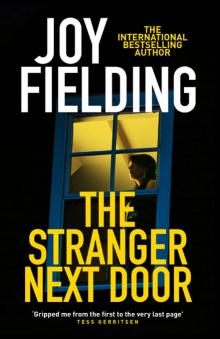 The Stranger Next Door
The Stranger Next Door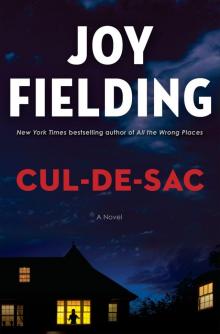 Cul-de-sac
Cul-de-sac The Final Act
The Final Act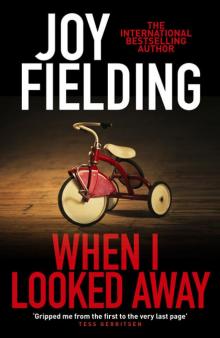 When I Looked Away
When I Looked Away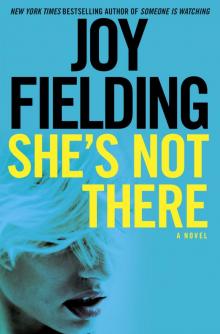 She's Not There
She's Not There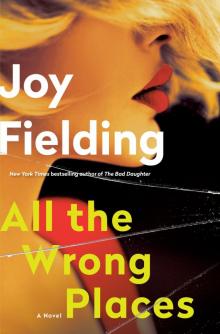 All the Wrong Places
All the Wrong Places Now You See Her
Now You See Her Don't Cry Now
Don't Cry Now Good Intentions
Good Intentions Still Life
Still Life Lost
Lost The First Time
The First Time Whispers and Lies
Whispers and Lies The Other Woman
The Other Woman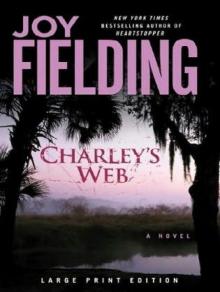 Charley's Web
Charley's Web Mad River Road
Mad River Road Puppet
Puppet Life Penalty
Life Penalty The Wild Zone
The Wild Zone Home Invasion
Home Invasion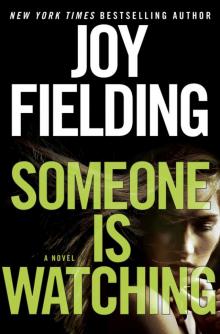 Someone Is Watching
Someone Is Watching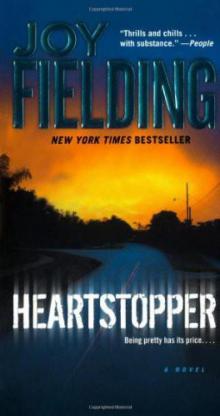 Heartstopper
Heartstopper See Jane Run
See Jane Run The Bad Daughter
The Bad Daughter Shadow Creek
Shadow Creek Missing Pieces
Missing Pieces Kiss Mommy Goodbye
Kiss Mommy Goodbye Grand Avenue
Grand Avenue